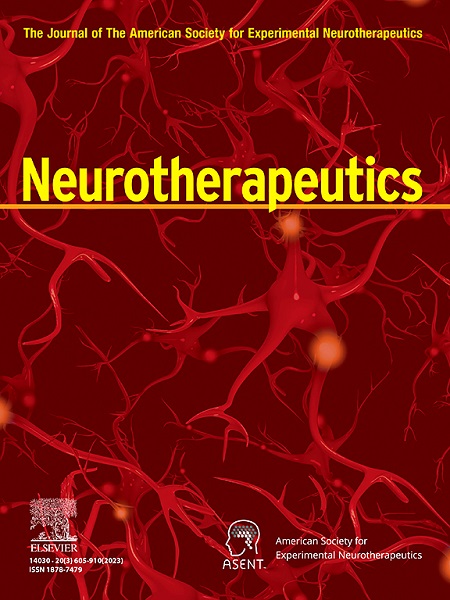Reversal of cognitive deficits in FUSR521G amyotrophic lateral sclerosis mice by arimoclomol and a class I histone deacetylase inhibitor independent of heat shock protein induction
IF 5.6
2区 医学
Q1 CLINICAL NEUROLOGY
引用次数: 0
Abstract
Protein misfolding and mislocalization are common to both familial and sporadic forms of amyotrophic lateral sclerosis (ALS). Maintaining proteostasis through induction of heat shock proteins (HSP) to increase chaperoning capacity is a rational therapeutic strategy in the treatment of ALS. However, the threshold for upregulating stress-inducible HSPs remains high in neurons, presenting a therapeutic obstacle. This study used mouse models expressing the ALS variants FUSR521G or SOD1G93A to follow up on previous work in cultured motor neurons showing varied effects of the HSP co-inducer, arimoclomol, and class I histone deacetylase (HDAC) inhibitors on HSP expression depending on the ALS variant being expressed. As in cultured neurons, neither expression of the transgene nor drug treatments induced expression of HSPs in cortex, spinal cord or muscle of FUSR521G mice, indicating suppression of the heat shock response. Nonetheless, arimoclomol, and RGFP963, restored performance on cognitive tests and improved cortical dendritic spine densities. In SOD1G93A mice, multiple HSPs were upregulated in hindlimb skeletal muscle, but not in lumbar spinal cord with the exception of HSPB1 associated with astrocytosis. Drug treatments improved contractile force but reduced the increase in HSPs in muscle rather than facilitating their expression. The data point to mechanisms other than amplification of the heat shock response underlying recovery of cognitive function in ALS-FUS mice by arimoclomol and class I HDAC inhibition and suggest potential benefits in counteracting cognitive impairment in ALS, frontotemporal dementia and related disorders.
阿利莫司洛尔和一类组蛋白去乙酰化酶抑制剂可逆转 FUSR521G 肌萎缩侧索硬化症小鼠的认知缺陷,而与热休克蛋白诱导无关。
蛋白质错误折叠和错误定位是家族性和散发性肌萎缩性脊髓侧索硬化症(ALS)的共同特征。通过诱导热休克蛋白(HSP)以提高伴侣能力来维持蛋白稳态是治疗渐冻人症的一种合理治疗策略。然而,神经元上调应激诱导型 HSP 的阈值仍然很高,这给治疗带来了障碍。本研究使用表达 ALS 变异体 FUSR521G 或 SOD1G93A 的小鼠模型,以跟进之前在培养运动神经元中进行的研究,这些研究显示 HSP 协同诱导剂阿瑞莫司醇和 I 类组蛋白去乙酰化酶(HDAC)抑制剂对 HSP 表达的不同影响取决于所表达的 ALS 变异体。与培养神经元一样,转基因的表达或药物处理都不会诱导 FUSR521G 小鼠皮质、脊髓或肌肉中 HSP 的表达,这表明热休克反应受到了抑制。然而,阿瑞莫司洛尔和 RGFP963 能恢复认知测试的表现,并改善皮质树突棘密度。在 SOD1G93A 小鼠中,多种 HSPs 在后肢骨骼肌中上调,但在腰椎脊髓中没有上调,只有与星形细胞增多有关的 HSPB1 除外。药物治疗可提高收缩力,但会降低肌肉中 HSPs 的增加,而不是促进其表达。这些数据表明,通过阿瑞莫司洛尔和 I 类 HDAC 抑制剂,ALS-FUS 小鼠认知功能的恢复除了热休克反应的扩大之外,还有其他机制。
本文章由计算机程序翻译,如有差异,请以英文原文为准。
求助全文
约1分钟内获得全文
求助全文
来源期刊

Neurotherapeutics
医学-神经科学
CiteScore
11.00
自引率
3.50%
发文量
154
审稿时长
6-12 weeks
期刊介绍:
Neurotherapeutics® is the journal of the American Society for Experimental Neurotherapeutics (ASENT). Each issue provides critical reviews of an important topic relating to the treatment of neurological disorders written by international authorities.
The Journal also publishes original research articles in translational neuroscience including descriptions of cutting edge therapies that cross disciplinary lines and represent important contributions to neurotherapeutics for medical practitioners and other researchers in the field.
Neurotherapeutics ® delivers a multidisciplinary perspective on the frontiers of translational neuroscience, provides perspectives on current research and practice, and covers social and ethical as well as scientific issues.
 求助内容:
求助内容: 应助结果提醒方式:
应助结果提醒方式:


